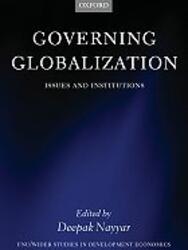Book Chapter
Towards Global Governance
The United Nations and the Bretton Woods institutions were created in an altogether different context. The countries that created them wanted to improve the living conditions of their people through rapid industrialisation and to participate in a more democratic world where the structure of governance treated nations as equal partners. In the pursuit of these objectives, the role of the nation state was perceived as critical everywhere. The perspectives on the management of economies in the industrialised world and strategies of development in the developing world, or in the erstwhile socialist bloc, are now very different. There were a few voices of dissent at the time, but it was, in effect, the development consensus of that era. The widespread acceptance of this approach, it would seem, represented a new consensus in thinking about development that came to be known as the Washington consensus. Privatisation, liberalisation, and globalisation have gathered momentum. This process has placed new players centre stage in the world economy.
 Join the network
Join the network